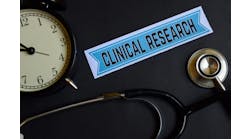The Association of Cancer Care Centers is collaborating with oncology-focused health tech company Flatiron Health to promote increased access to clinical trials in the community setting.
The two organizations are working to broaden access to Flatiron Clinical Pipe, an electronic health record (EHR)-to-electronic data capture (EDC) connector that improves efficiency and reduces time and effort of clinical study data capture.
Healthcare Innovation recently spoke to ACCC’s new president, Nadine J. Barrett, Ph.D., M.A., M.S., about reimagining community engagement and equity in cancer. “When we look at cancer outcomes, we see that underrepresented and minoritized populations tend to carry the greatest burden of disease so they're more likely to have higher incidence and mortality of the disease, and least likely to be represented in clinical trials that could potentially be life-enhancing or life-saving,” she said.
Over the past several years, Flatiron Health has built up an oncology-focused EHR network and a de-identified database from more than 280 U.S. academic and community cancer clinics in order to enable large-scale real-world research. Its EHR-to-EDC tool captures and transfers clinical study structured and unstructured data. In a recent pilot study with a pharmaceutical company, Flatiron Clinical Pipe users saw an average of one hour of time savings per patient visit on laboratory data alone, the company said. With access to Flatiron Clinical Pipe, ACCC practitioners and member practices will be able to improve efficiency and reduce time and effort of study data capture, enabling centers to conduct more clinical studies and offer paths to redirect resources to patient care, Flatiron added.
"This collaboration with Flatiron Health marks a significant moment for us at ACCC. By bringing cutting-edge tech to our community cancer centers, this partnership will make clinical trials more accessible, streamline data management, and help us deliver improved care to our patients across cancer care settings more efficiently and effectively,” said Sumanta K. Pal, M.D., chair of ACCC’s Community Oncology Research Institute (ACORI), in a statement. “We look forward to continuing our work together to realize the full impact and value our partnership can bring to improve the experience of every person with cancer.”
“This partnership with ACCC has myriad benefits, with one of the most important being the ability to reduce research staff workloads,” said Ivy Altomare, M.D., head of research oncology, clinical research at Flatiron Health, in a statement. “By putting Flatiron Clinical Pipe in the hands of more community cancer care centers, Flatiron and ACCC will enhance ongoing efforts to expand the footprint of cancer research in the community, broadening access to and representativeness of cancer clinical trials.”
ACCC announces 2024 Innovator Award Winners
ACCC also recently announced the winning cancer care programs for its 14th annual ACCC Innovator Awards. The awards recognize innovative and replicable solutions for oncology care from cancer centers nationwide. Here are brief descriptions of the 2024 award winners:
Mercy, Mercy Oncology Services
St. Louis, Missouri
Smart-Texting High-Risk Patients After Chemotherapy Reduces ED Visits
This machine learning algorithm runs nightly and is linked to a smart texting application that goes out to patients every morning for 7 days following chemotherapy, asking about symptoms like diarrhea, fever, nausea, vomiting, and pain. Patients reporting severe or worsening symptoms have the smart text escalated to the oncology clinic where they received chemotherapy. Initial analysis broken down by responders (those that opted in and answered the daily text messages) and non-responders (opted out or opted in but did not answer the texts) found that ED visits were 5.7% for responders compared to 6.7% for non-responders. Across the health system, about 30 responders are added daily to the program.
Munson Healthcare, Cowell Family Cancer Center
Traverse City, Michigan
Implementation of a Bispecific T-Cell Engager Therapy Program at a Community Cancer Center
Development of this comprehensive bispecific antibody program included policy development; toxicity management; creation of patient and staff education documents; creation of clinician tools like a toxicity scoring and charting tool and an electronic order set that segregates treatment options; and a monitoring system to safely transition patients from inpatient to outpatient care.
RWJBarnabas Health, Rutgers Cancer Institute of New Jersey, Cooperman Barnabas Medical Center
Livingston, New Jersey
A Sustainable Model for Improved Quality for Pancreatic Cyst Surveillance and Early Pancreatic Cancer Detection
This AI-driven incidental findings program identifies and then monitors pancreatic abnormalities to improve the quality of care to patients who are at increased risk for developing pancreatic cancer. To do so, the patient management software integrates with the electronic health record and facilitates patient identification, risk assessment, care plan tracking, patient and provider communication, outcomes recording, and registry functionality. In the 2 years following program implementation, 82 pancreatic cancers were detected from incidental findings with 65% of patients being diagnosed in earlier stages (stages I, II, and II), as well as instances of ampullary cancer, gallbladder cancer, and gastric cancer.
St. Luke's University Health Network, St. Luke's Cancer Care
Easton, Pennsylvania
A One-Stop Breast Clinic Improves Time to Diagnosis and Patient Satisfaction
This accelerated delivery platform improves clinic workflow and speeds up breast cancer diagnosis and treatment planning. From screening mammogram, a clinical pathway flags patients who meet One-Stop Breast Clinic criteria, eliminating the traditional “first come, first served” scheduling model. To date, more than 300 patients have benefited from this rapid diagnostic approach, receiving their diagnosis in 3 to 7 days, far below the national average of 26 days.
The Ohio State University Comprehensive Cancer Center, Arthur G. James Cancer Hospital and Richard J. Solove Research Institute
Columbus, Ohio
Leveraging the EHR to Automate Biosimilar Selection and Streamline the Prior Authorization Process
This rule-based informatics solution pulls from the electronic health record to automate the election of an appropriate biosimilar therapy based on the patient’s insurance and hospital formulary preferences, streamlining prior authorization and approval processes. This e-tool decreased administrative burden to providers, pharmacists, and prior authorization specialists and increased biosimilar utilization by 21.9%.
University of Colorado – UCHealth, University of Colorado Cancer Center
Aurora, Colorado
Creating a Community-Wide Safety Net for Centralized Tracking and Management of Incidental Lung Nodule Findings
Enterprise intelligence software analyzes imaging results of all patients treated at UCHealth to identify and stratify those with high-risk findings. When a concerning abnormality is found, patients and providers are alerted to the finding, and patients are referred for additional follow-up. After this system-wide approach led to a 2,514% increase in actively managed patients, a centralized care management function was implemented to streamline processes, reducing the time to recommend next steps from 34 to 5 days.


